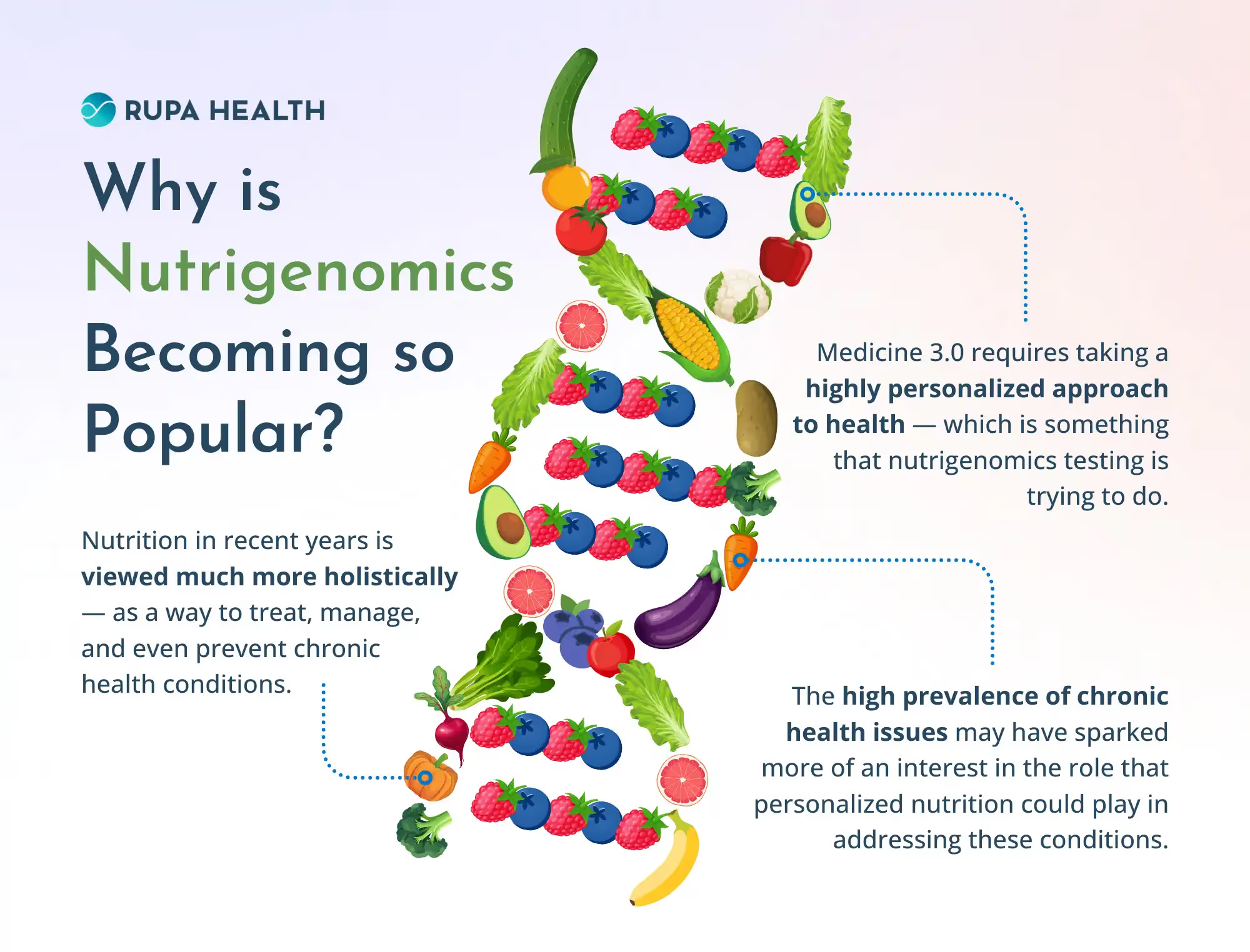Key Takeaways:
- A recently published report estimates that the nutrigenomics market will generate $2.1 billion by 2032.
- There are many factors that have contributed to the rise of nutrigenomics — from the advent of Medicine 3.0 to the prevalence of chronic diseases in the U.S.
- While there are still ongoing discussions around the regulation and efficacy of nutrigenomics, it’s likely that we’ll continue to see this market flourish.
A new report published by Allied Market Research shows that the nutrigenomics market is anticipated to generate $2.1 billion by 2032 — which represents a compound annual growth rate of 17.2% from 2023 to 2032.
Even though the door to nutrigenomics was opened back in the 1990s, as a result of The Human Genome Project, it’s clear that this field of study has been garnering more interest in recent years — and is expected to see significant growth over the next decade. (1)
In this article, we’ll explore why that is, and what we can expect from the nutrigenomics market in the future.
[signup]
What is nutrigenomics?
Nutrigenomics, also known as nutritional genomics, is the study of how genes and nutrition interact. Your genetic variation can be used to predict how your body may respond to different nutrients.
Nutrigenomics testing
There are several ways to access nutrigenomics testing. You can go to a genetic testing specialist or facility. There are also an increasing number of at-home, direct-to-consumer genetic lab tests available online these days.
An example of an at-home test is DNA Diet from DNALife, which uses genetics to guide the personalization of diet recommendations by providing guidelines into which diet type, such as low carbohydrate, low fat, or Mediterranean diet, might best align with your genetic variations.
However, the problem with these at-home tests is that the results can often be overwhelming and difficult to take action on alone. That's why we always recommend working with either a functional medicine practitioner or any other healthcare practitioner who is knowledgeable about nutrigenomics.
Use cases for nutrigenomics
The biggest promise of nutrigenomics testing is that it can reveal how our body might respond to certain nutrients. This information can then allow your healthcare practitioner to offer more personalized dietary guidance.
For example, a nutrigenomic test might suggest that you could have issues absorbing vitamin B12. Knowing this, your functional medicine practitioner may design a plan to help ensure you’re getting enough B12 in your system and support your overall health.
Epigenetics has also shown us that nutrition may affect which genes are switched on or off. So nutrigenomic tests can also reveal the potential effects of certain diets on gene expression. For example, a study found that there’s an association between a high glycemic-index diet and insulin resistance and type II diabetes. (2)
Why is nutrigenomics becoming so popular?
With nutrigenomics having been around since the ‘90s, it’s worth questioning why the industry is experiencing such a spike in popularity now. There may be a few reasons for this:

- Prevalence of chronic health issues. According to the Centers for Disease Control and Prevention, chronic diseases such as heart disease, cancer, and diabetes are the leading causes of death and disability in the United States. Specifically, six out of every ten adults have at least one chronic disease, and about four in ten have two or more chronic diseases. The high prevalence of chronic health issues may have sparked more of an interest in the role that personalized nutrition could play in supporting these conditions.
- Acknowledgment of nutrition’s role in health. For a long time, our understanding of nutrition was very one dimensional — perceiving food as a source of calories and nothing else. But an increasing number of people in recent years, including healthcare practitioners, are viewing nutrition much more holistically — as a way to support, manage, and even help prevent chronic health conditions.
- A move toward personalized healthcare. Dr. Peter Attia often talks about the advent of Medicine 3.0, which is a new era of medicine that focuses on maintaining healthspan — and is a shift that more people (especially those in younger generations) are excited about. According to Dr. Attia, part of fully transitioning from Medicine 2.0 to Medicine 3.0 requires taking a highly personalized approach to health — which is something that nutrigenomics testing is trying to do.
[signup]
The future of nutrigenomics
There are many factors to consider in the future of nutrigenomics. One is that there are still ongoing debates about whether nutrigenomic testing can actually address the development of chronic disease.
A study found that, despite 97 gene variants identified as contributing to fat accumulation, they explain less than 3% of BMI variance. In other words, genes can’t entirely explain why certain people are predisposed to certain conditions, such as obesity — making it unclear how effective nutrigenomics could be. (3)
The Allied Market Research Report also comments on the implications of increased government regulation and the growing number of direct-to-consumer nutrigenomics tests:
“However, limited awareness and government regulation regarding genetic research or testing may hamper market growth in the coming future. On the contrary, the expansion of direct-to-consumer nutrigenomics services and the integration of nutrigenomics in healthcare systems are expected to offer remunerative opportunities for the expansion of the nutrigenomics market during the forecast period.”
While there are still ongoing conversations and potential challenges when it comes to nutrigenomics, it’s clear that there’s a growing interest in this type of personalized approach to healthcare — and it’s likely we’ll see this market continue to evolve and grow in the coming years.












%201.svg)







